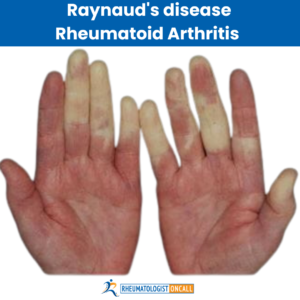SHARE
Rheumatoid Arthritis (RA) isn’t just about pain, swelling, and stiffness in your joints. This autoimmune disease can target multiple parts of your body from the eyes to the nerves, brain, heart, and lungs, but so much more. If you have other symptoms, they might be due to Rheumatoid Arthritis.
Most people who will come for a consultation will complain of the COMMON signs and symptoms of Rheumatoid Arthritis, which are:
- Joint pain, especially in the hands and feet
- Swelling of the Joints
- Inability to use the hands or walk properly
- Morning stiffness that lasts for more than one hour.
When I start interviewing them, I often find many other signs and symptoms they do not even think are caused by Rheumatoid arthritis (RA).
This article will discuss ten UNCOMMON signs and symptoms that might be due to Rheumatoid Arthritis (RA):
1.Overwhelming Fatigue
Most patients with Rheumatoid Arthritis (RA) complain about being tired. This can majorly impact their daily activity, making it hard to focus on their job responsibilities. Most of the time, the cause of fatigue is not only one but a multitude of factors that may contribute as
- Anemia due to a chronic disease
- Thyroid disease
- Pain itself
- Depression
- Difficulties to sleep due to pain
- Ongoing inflammation in the body due to uncontrolled disease.
In my clinic, Rheumatologist Oncall, I take all the patient’s symptoms seriously and try to understand if any underlying causes can be optimized. I use many tools, from laboratory to changes in nutrition, supplements, changes in physical activity, and even mindfulness.
2.Low-grade Fevers
Persistent low-grade fevers indicate how your body reacts to Rheumatoid Arthritis inflammation. If you are experiencing fevers, calling your doctor and discussing your symptoms is important. Fevers can be caused by:
- Infections that mimic RA: parvovirus, Hepatitis B, Hepatitis C, HIV or Chichungunya
- Infections: Patients who develop fever and use certain medications that can lower the immune system (e.g., steroids, disease-modifying anti-rheumatic drugs, biologics – DMARDs, biologics ) must be evaluated for a possible infection. You may have a sinus infection, pneumonia, or a urinary tract infection.
- Lymphomas/ cancers: Patients diagnosed with Rheumatoid Arthritis might be at increased risk for developing cancers, so if no infection is detected, it is important to be evaluated for this possibility. In addition, patients taking immunosuppressive medications may also have an increased risk of developing cancer, although this is still under debate at this time.
- Uncontrolled Rheumatoid Arthritis: If the Rheumatoid Arthritis is not well controlled, you continue to have pain, swelling, and severe stiffness in the joints, and ongoing inflammation can also cause low-grade fevers.
3.Raynaud’s disease

Raynaud’s disease or phenomenon or disease is a change in the color of your fingers or toes, sometimes the nose or ears. Your fingers can become white and be painful, developing tingling and numbness. Then, the fingers will turn bluish as the blood supply in these areas decreases and then turn red again. These episodes can last seconds or minutes and can be severely painful.
About a quarter of patients with Rheumatoid Arthritis will have Raynaud’s phenomenon.
4. Sjögren’s disease
Sjögren’s disease can manifest in two forms: primary and secondary. In its primary form, Sjögren’s appears as the sole systemic disease. However, its secondary form coexists with other connective tissue diseases, especially rheumatoid arthritis (RA) or lupus. Patients with Rheumatoid Arthritis often experience symptoms like dry eyes and mouth, especially when their inflammation isn’t well-managed.
The dryness in the eyes is described as a gritty, sand-like sensation and may result in redness. The dryness in the mouth increases the risk of gum disease or periodontal disease.
5. Bilateral Carpal Tunnel Syndrome (CTS)
In my clinic, I had multiple patients who were sent for evaluation due to carpal tunnel symptoms. But instead of having one hand affected, these patients had Carpal Tunnel Syndrome (CTS) in both hands. There are only a few situations that can cause CTS in both hands, and they are
- Pregnancy
- Diabetes
- Thyroid disease
If you are not with any of these diseases, it may be Rheumatoid Arthritis. Do not go for surgery before checking with a rheumatologist. In my practice, Rheumatologist OnCall, I have seen patients who first underwent a few surgeries for CTS in both hands without success as they were suffering from RA.
6. Breathing issues
Rarely, patients undiagnosed yet with Rheumatoid Arthritis will present to their doctor for difficulties with their breathing. Some patients might experience shortness of breath with walking, while others with rest. In the process of evaluation of a lung disease, you might get tested for an autoimmune disease. Rheumatoid Arthritis is one of the autoimmune diseases that can also affect the lungs. Usually, patients with RA, after years of battling inflammation, might get their lungs affected.
7. Neck pain
Yes, Rheumatoid Arthritis can affect the neck spine (cervical spine). This is the most common part of the spine affected by Rheumatoid Arthritis. If you develop pain and stiffness and cannot move your head, this can be a sign of Rheumatoid Arthritis. Some patients can also develop pain that goes down on their arms.
This is important! If you need any surgery requiring intubation, then remind the doctors that you suffer from Rheumatoid Arthritis. They should order X-rays of the cervical spine to evaluate for any changes like subluxation or instability of the cervical spine that may complicate the intubation process.
8.Jaw pain
Pain in the jaw is seen in about 50% of patients with Rheumatoid Arthritis and is caused by temporomandibular joint inflammation (TMJ). If you experience
- Facial pain
- Headaches
- Ear discomfort
- You can’t open your mouth fully
- Clicking or popping noises in the jaw
- Intermittent jaw locking
Make sure you check with your doctor. Some patients benefit from orthodontic treatments, even changing the treatment for Rheumatoid Arthritis.
9 Eye Problems
Rheumatoid arthritis (RA) may affect your eyes, causing inflammation of the sclerae (the white part of the eyes). This is called scleritis or episcleritis. If you develop pain, redness, and visual changes, you should contact an eye specialist immediately.
If Rheumatoid Arthritis is untreated for many years, it may lead to even more complications, such as vision loss (e.g. scleromalacia perforans). Thus, ensure you stay in close contact with your rheumatologist and keep your Rheumatoid Arthritis under control.
10. Voice and Throat Issues
Do you experience any change in your voice? If you suffer from Rheumatoid Arthritis, the change in voice and hoarseness can be related to the inflammation affecting your voice box. About 30% of patients with Rheumatoid Arthritis may experience changes in voice due to inflammation of the joint in the larynx (cricoarytenoid joint).
Conclusion
Rheumatoid Arthritis is a disease that requires special attention and an expert who can connect the dots of the puzzle. Here, at Rheumatologist OnCall, our focus is to treat patients with Rheumatoid Arthritis and help them to achieve the best quality of life, minimizing the need for medication. We have a unique and personalized approach that will integrate the most advanced therapies with a natural, more holistic approach focusing on your nutrition, lifestyle changes, and the power of your mind. If you need help, do not hesitate to reach out.














